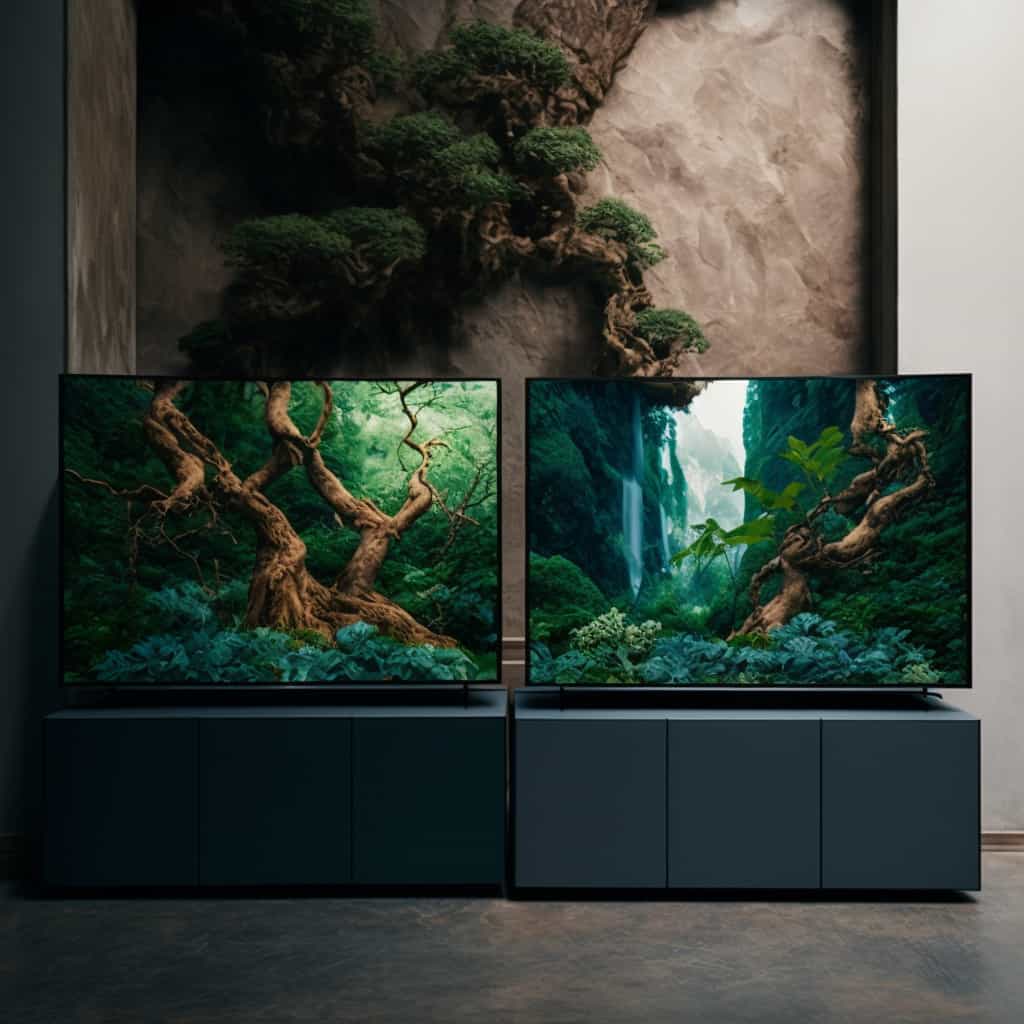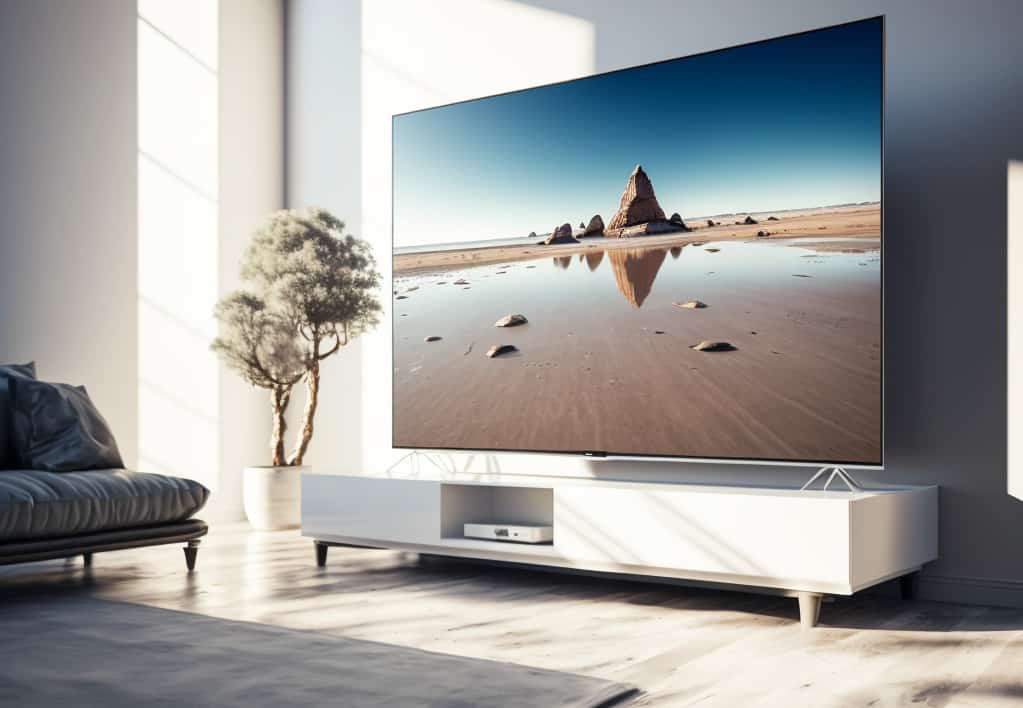QLED vs OLED: A Detailed Comparison of the Two Leading TV Technologies

When it comes to purchasing a new TV, two of the main technologies that you’ll encounter are QLED and OLED. Both offer their own unique benefits and features, but how do you know which one is the best choice for you? We’re going to do a QLED vs OLED TV comparison, so that after reading this article you can decide which one suits you the most.
What Is QLED Technology?
QLED stands for «quantum dot LED.» It’s a type of LED (light emitting diode) display that uses quantum dots to produce more vibrant and accurate colors. Quantum dots are tiny semiconductor particles that are about 1,000 times smaller than the width of a human hair. When light is shone through them, they emit specific wavelengths of light depending on their size. This allows QLED TVs to produce a wider range of colors, resulting in a more lifelike and realistic picture.
One of the main benefits of QLED technology is its high brightness levels. Because QLED TVs use LED backlighting, they are able to achieve much higher peak brightness levels than OLED TVs.
This is especially important for HDR (high dynamic range) content, as it allows for greater detail and contrast in the highlights and shadows of the image.
QLED TVs are also able to maintain their brightness levels over time, as the quantum dots do not degrade like organic materials do.
What Is OLED Technology?
OLED stands for «organic light emitting diode.» Unlike QLED TVs, which use a backlight to produce an image, OLED TVs have pixels that can be turned on and off individually. This allows for perfect black levels and an infinite contrast ratio, as each pixel can be completely turned off when displaying black.
OLED TVs are known for their deep blacks and excellent picture quality. Because each pixel can be turned off individually, there is no light bleeding or haloing around objects, resulting in a more detailed and realistic image. OLED TVs also have a wide viewing angle, meaning that the picture quality remains consistent no matter where you’re sitting in the room.
QLED vs OLED: Which TV Technology Is Better on Each Situations?
Now that we’ve discussed the basics of QLED and OLED technology, let’s take a look at which one is the better option for various situations.
Depending On The Usage
Gaming
Both QLED and OLED TVs can be good choices for gaming, depending on your preferences. QLED TVs tend to have a higher refresh rate, which can make fast-paced games feel more responsive and smooth.
They also have lower input lag, which means that there is less delay between when you press a button and when the action is displayed on the screen.

However, OLED TVs have an advantage when it comes to motion handling, as they are able to display fast-moving objects more clearly and without blurring. If you’re a casual gamer, either technology may be sufficient, but if you’re a competitive gamer or prefer fast-paced games, QLED may be the better choice.
Movie Watching
If you’re a movie enthusiast, OLED TVs may be the way to go. Because they can produce perfect blacks and an infinite contrast ratio, they are able to display a more cinematic image with greater detail and realism. QLED TVs, while still capable of producing good picture quality, may not offer the same level of depth and contrast as OLED TVs.

Nonetheless, high end QLED TVs are capable of offering a better image during daylight and bright scenes thanks to the higher brightness peak, this is a good factor if you don’t normally watch any dark movies or shows, as a QLED would offer a better image in this case.
Depending On The Budget and Energy Efficiency
Budget
If price is a major factor in your decision, QLED TVs may be the more budget-friendly option. While OLED TVs tend to be more expensive, there are some QLED TVs available at lower price points. It’s important to keep in mind, however, that you may have to compromise on features or performance if you opt for a cheaper QLED TV.
Energy Efficiency
If energy efficiency is a concern for you, OLED TVs may be the better choice. While QLED TVs are generally more energy efficient than traditional LED TVs, OLED TVs use even less power. This is because OLED TVs don’t require a backlight, as each pixel produces its own light. However, it’s important to note that the difference in power consumption between QLED and OLED TVs is generally small and may not be significant in the long run.
Ultimately, the best choice for you will depend on your specific needs and preferences. It’s important to consider all of the factors that are important to you and do your own research before making a decision.
Depending On The Room

Bright Room
If you’ll be using your TV in a bright room, QLED may be the better option. As we mentioned earlier, QLED TVs have a higher peak brightness level, which makes them better able to combat glare and reflections. OLED TVs, on the other hand, can struggle in bright rooms due to their lower peak brightness levels.
Dark Room
If you’ll be using your TV in a dark room, OLED may be the better option. Because OLED TVs can turn off individual pixels, they are able to produce perfect blacks and an infinite contrast ratio. This results in a more detailed and realistic image, especially when watching movies or TV shows with a lot of dark scenes. QLED TVs, while still capable of producing good black levels, cannot achieve the same level of detail and contrast as OLED TVs.
Conclussion
In conclusion, QLED and OLED technology both have their own unique strengths and weaknesses. QLED TVs offer high brightness and good color performance, while OLED TVs have excellent contrast and deep blacks but lower brightness. While both technologies can produce high-quality images, the best choice for you will depend on your specific needs and preferences.
Whether you’re a movie buff, a gamer, or just looking for a high-quality TV, it’s important to do your own research and consider all the factors before making a decision. Ultimately, either technology can be a great choice, but it’s important to find the one that best fits your needs and budget.
We hope that this comparison between OLED and QLED TV technologies helped you have a more clear understanding of both of them, and that translates into you making the best buy posible for your needs.
| Feature | QLED | OLED |
|---|---|---|
| Brightness | High | Low |
| Contrast | Good | Excellent |
| HDR | Good | Excellent |
| Price | Moderate to high | High |
| Power consumption | Moderate | Low |
What to Look For when Buying a TV
If you want to know more about TV and all the specs they have, don’t forget to take a look at this article here
«TV Buying Guide: The Ultimate Home Theater Experience»

